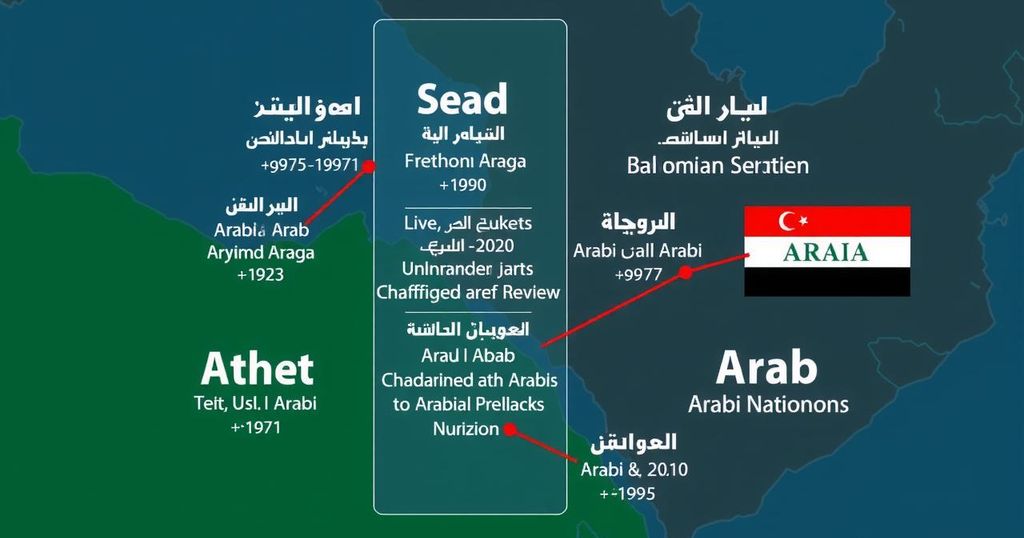Arab Nations Respond to Israeli Military Action Against Iran

On October 26, 2024, Israel conducted a military assault on Iran, prompting strong condemnations from multiple Arab nations including Saudi Arabia, the UAE, Iraq, Qatar, Oman, Syria, and Jordan. These countries collectively urge restraint, emphasizing the need to avoid further escalation amidst already heightened tensions in the Middle East due to ongoing conflicts in Gaza and Lebanon.
On October 26, 2024, Israel executed a series of military strikes on various installations in Iran, specifically targeting missile facilities without impacting critical oil and nuclear infrastructure. This action has sparked significant concern and condemnation from various Arab nations in the Middle East. In light of heightened regional tensions, which are exacerbated by ongoing conflicts in Gaza and Lebanon, regional allies have urged both parties to exercise restraint in order to prevent further escalation of violence. The Israeli military has publicly accepted responsibility for the attacks, claiming that the operations were executed by multiple aircraft in three successive waves against strategic sites. Furthermore, Israel has delivered a warning to Iran regarding the consequences of retaliation. Detailed responses from Middle Eastern countries are as follows: Saudi Arabia formally condemned the strike on the basis that it violates Iranian sovereignty and international law. A statement by the Saudi Press Agency reasserted the Kingdom’s disapproval of the ongoing regional escalations, calling for all parties to demonstrate restraint and work towards reducing tensions. The United Arab Emirates also rebuked the attacks, with its Foreign Ministry expressing deep concern over the regional ramifications and urging both parties to show moderation. Iraq’s Prime Minister’s office denounced the aggression, linking it to a broader pattern of Israeli hostility in the region. Iraq called for a cessation of conflict, particularly regarding the ongoing crisis in Gaza and Lebanon. Qatar, recognized as a mediator amidst the Gaza tensions, conveyed its apprehension regarding the serious implications of Israel’s actions on Iran through its Ministry of Interior. Oman highlighted that Israel’s aggression risks perpetuating a cycle of violence and jeopardizes existing efforts to alleviate tensions. Oman called upon the international community to intervene to halt such violations. Syria has publicly expressed solidarity with Iran, emphasizing its support for Iran’s right to defend its sovereignty and protect its citizens. Jordan characterized the Israeli attack as a breach of international law and sovereignty, emphasizing the need for international accountability in halting Israel’s aggressions across the region. The collective reactions from these Arab states demonstrate a unified stance against the Israeli actions, reflecting a broader concern related to regional stability and security.
This event occurs against a backdrop of persistent geopolitical tensions in the Middle East, marked by ongoing conflicts and rivalries. Israel and Iran’s relationship has been particularly fraught, characterized by mutual animosity and periodic military confrontations. The recent Israeli attacks come at a time when the region is already inflamed with conflicts arising from the Gaza situation and tensions in Lebanon. The calls for restraint from regional powers are indicative of the fear that this latest strike could escalate into wider hostilities, further complicating the already complex dynamics of Middle Eastern politics.
In summary, Israel’s military strikes on Iranian sites have elicited widespread condemnation from various Arab nations, each echoing calls for restraint amidst fears of escalating conflict. Nations such as Saudi Arabia, the UAE, Iraq, Qatar, Oman, Syria, and Jordan have articulated their disapproval of the attacks, reinforcing their commitment to regional stability and collective security. The situation remains precarious, and the international community’s response may play a crucial role in mitigating further aggression.
Original Source: en.tempo.co








